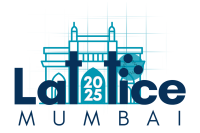Speaker
Indrakshi Raychowdhury
Description
Understanding thermalization in isolated non-Abelian gauge theories is a key challenge for quantum simulation. We present a study of the Eigenstate Thermalization Hypothesis (ETH) in 1+1-dimensional SU(2) lattice gauge theory with one flavor of dynamical staggered fermions. Using the gauge-invariant Loop-String-Hadron (LSH) framework, we perform exact diagonalization on finite lattices to analyze the validity of diagonal and off-diagonal ETH for local operators, such as electric field or matter density and non-local observables, such as mesonic strings of varying length. This work provides a direct test of ETH in a non-Abelian gauge theory and establishes a benchmark for future quantum simulations of thermalization dynamics.
| Parallel Session (for talks only) | Theoretical developments and applications beyond Standard Model |
|---|
Authors
Diptarka Das
(Indian Institute of Technology - Kanpur)
Mr
Lukas Ebner
Dr
Saurabh V. Kadam
(University of Washington, Seattle)
Indrakshi Raychowdhury
Andreas Schaefer
Xiaojun Yao
(University of Washington)
